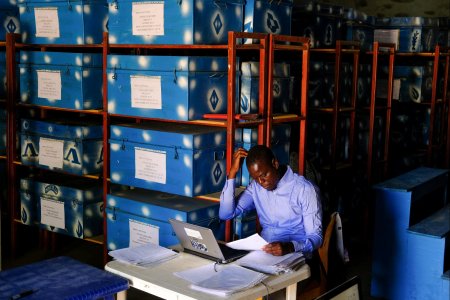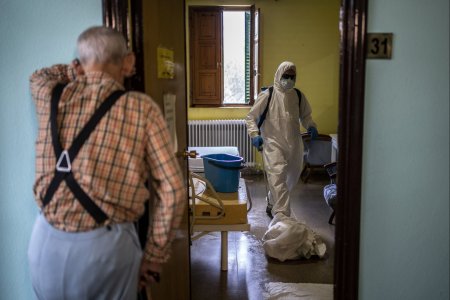
An epidemiologist’s analysis of the Covid-19 crisis - Part 1
Emmanuel Baron & Elba Rahmouni
Crisis situation, response strategies, hydroxychloroquine, interventional epidemiology and the state of scientific research in Africa: Elba Rahmouni interviews Emmanuel Baron, Director of Epicentre, Médecins Sans Frontières
The second part of the interview is available here.
A crisis situation and response strategies
Before starting this interview, I would like to clarify the methodology I’ll be using here to avoid any misunderstandings. We are dealing with an event that is totally unlike anything we have ever come across in terms of intensity and global scale. At this stage in the pandemic, a critical analysis is needed, if only to correct any current control strategies that are proving ineffective. However, we must avoid making what I call “easy criticism” based on a posteriori reconstructions or simple beliefs, especially given the amount of uncertainty still surrounding Covid-19. In this interview, I shall therefore be sharing my thinking with you on a number of issues drawing on my experience with Médecins Sans Frontières and Epicentre; I am not here to judge the actions of governments faced with the task of managing all the different components of the outbreak at national level.
That said, France’s successive governments have never taken the possibility of this type of situation into account in their policies, whether with regard to the stocks of masks, the development of public hospitals within the country’s health system, the importance of prevention or support for the research & development of drugs and vaccines. The result is a series of structural failures with the consequences that we are now suffering. Furthermore, at the start of the outbreak, neither the medical profession, nor the politicians nor the social bodies paid the necessary attention to the situation. We were simply not willing to contemplate such an event. A typical reaction in any disaster.
What is the current health situation in France?
We have almost 7,000 people in intensive care for a standard capacity in France of around 5,000 for all types of cause (severe flu, polytrauma, septic shock, neurological problems, etc.). Hospital personnel are fully mobilised and have shown an impressive capacity to adapt. The authorities have attempted to stem the flow of patients with the lockdown. But they have done so at the expense of other things (such as the health and social consequences of a lockdown) and overlooked the non-hospital-based aspects of the response. As a result, many professionals, including general practitioners, have not been given protective equipment, and the situation in care homes is disastrous. So far, everything has been focused on coping with the inflow of hospital cases rather than managing all the other aspects of the epidemic.
With regard to the lockdown, I would just like to say that the people who have stayed at home have played their part in the response in the same way as the carers, delivery people, refuse collectors, supermarket cashiers, etc. We shouldn’t forget how very difficult the situation has been for them and the huge effort they have had to make every day. I’m thinking in particular of parents with difficult children - and children with difficult parents. And, more generally, of all the vulnerabilities and violence that exist within families
What is your thinking on the "collective immunity versus lockdown" alternative?
By definition, the lockdown does not help us develop herd immunity because its aim is to reduce the number of cases. Acquiring herd immunity is not sure, as immunologists still don’t have enough information to be able to estimate the nature and duration of individual protection.
If there is a second wave of the outbreak, will the President decide on another lockdown?
Firstly, the situation will be “desperate” if this happens. It will mean that basic hygiene measures, such as frequent hand-washing, wearing a mask, limited travel and bans on large gatherings, as well as strategies for tracking and quarantining will have failed.
Another lockdown would be less a public health decision (who to treat and how) than a societal choice. Lockdown is a strategy of extreme social distancing. It is mechanically effective in reducing the transmission of the virus, but at a huge social and economic cost. Yet, when deciding to impose a lockdown, France’s authorities never mentioned the economic and social consequences. They were taken as read in the “whatever the cost” statement made by President in his speech on Thursday 12 March 2020. This can be explained by the urgency of the situation at the time, but today, many questions and answers are emerging about the consequences of this measure and it should be possible to have a real public debate on the subject.
What are the different types of test?
There are two different types of tests: the PCR-based diagnostic test that says whether someone is infected. Even when done properly, the clinical sensitivity of a PCR test is 70-80%. In other words, there are 20-30% of false negatives. The other type of test are serological tests that show whether someone has been infected and has developed antibodies.
Serological tests are useful as part of a seroprevalence study, as these studies can tell us the level of infection among the population. For example, at the collective level, it can tell us what proportion of infections are mildly symptomatic or asymptomatic and, at the individual level, they may allow more freedom of movement to people who have already been infected based on the hypothesis that they have developed at least temporary immunity against the virus.
Has the French government been slow to use these diagnostic tests?
In France, we were unable to carry out these tests on a large scale. The government lacked clarity on this point and had to organise its response accordingly.
That said, at the beginning of this interview, I mentioned a posteriori reconstructions. We shouldn’t forget that on 25 February, nobody knew that the virus was circulating outside the identified clusters, and I don’t believe for a minute that we would all have agreed to go to the doctor to be tested for a mundane infectious syndrome - the most frequent form of the disease.
How are the tests currently being used in the response?
Today, to reduce the transmission and circulation of the virus, the government is attempting a new strategy with testing as the mainstay. The objective is to test suspected cases and then isolate them, possibly in hotels. Patients and their entourage will be immediately informed of the result and their contacts informed and monitored. It will also be a way of establishing contact with the patients, and not only from a medical perspective. This approach, which couldn’t be put in place at the start or the outbreak because of a lack of knowledge and resources, is one of the pillars of MSF's usual approach to epidemic management. So it would make sense for us to participate as a follow-on to our intervention in France.
What do you think about a policy of large-scale testing?
I don’t really understand what this policy would involve. It doesn’t make much sense to talk about prescribing diagnostic tests on a large scale without saying more about what would happen next. In medicine, you don’t examine someone for the sake of knowing and then do nothing. In other words, a diagnostic test must be given for a good reason. Apart from the capacity of countries to carry out these tests on a large scale, there would also be the issue of who to test. Do we need to test patients in order to treat them?In MSF’s experience in most epidemics, no confirmation of a suspected case is the rule and does not necessarily change the decisions taken. Care-providers do not want to waste time waiting for confirmation before referring or treating someone. In seasonal flu epidemics in France, doctors diagnose flu without confirmation. The criteria for admitting patients to hospital are based on the severity of the illness, not just the diagnosis.Can we test everyone who has been in contact with a sick person? Bearing in mind that some people are asymptomatic, is it feasible to repeatedly test people whose work regularly brings them into contact with a lot of people? After all, it is to be hoped that these people will be protecting themselves better than the rest of us and so be less likely to become infected or infect others. I think diagnostic tests are useful if we can follow up with an offer (and not an order) to self-isolate in centres or hotels.
In order to answer these questions of strategy, whether on testing or operational priorities for prevention and precaution, and implement a policy that ensures a proportionate response, we also need to know how people become infected. Who is falling ill in France today, where and how? Who is not protected properly and why? I’m surprised that these questions still haven’t been answered.
How far are we with our search for a vaccine?
To put it simply, diagnostics are for today, therapeutics for tomorrow and vaccines are for the day after tomorrow (i.e. in about 18 months) - although the scientists are beating all the speed records in this epidemic when it comes to development, especially with vaccines. WHO has encouraged the main researchers, manufacturers and funders to join forces and they have agreed to do so, and the US president has launched “Operation Warp Speed” to speed up the development of new vaccines. At this stage, nobody knows whether the current leads will take us anywhere. And, although we will probably have a vaccine one day, it is hard to say how effective it will be. But even with a low effectiveness, it is likely to be of use in controlling the pandemic. Then the challenges will be manufacturing: to ensure populations’ access to this vaccine, we will need to produce and distribute billions of doses. Another important point: political leaders have stated their intention to ensure that this vaccine remains a global asset and not the property of a particular manufacturer.
What do you think about the hydroxychloroquine controversy?
This business has resulted in a considerable and regrettable loss of time. A loss of time in China where the studies produced were not of sufficient quality to produce conclusive results. And then Professor Raoult, who picked up on the Chinese studies, wasted even more time by failing to produce any sound findings. In keeping with the codes of his profession, he should have immediately launched a study to reach findings that the scientific community could discuss. He made his first public statements in early February; it is now early May and we’re still waiting for answers.
Professor Raoult’s methods have been criticised from both an ethical and a scientific point of view. To show that something is tangible, to provide evidence and convince, we have to adopt methods that reflect the “state of the art” of our profession, so to speak. There is nothing shocking about this requirement; it exists in every profession. In medicine, it protects citizens from being prescribed ineffective or dangerous drugs. Imagine for one instant what we would say if a pharmaceutical laboratory attempted to commercialise a new drug based on currently available data on the effectiveness of hydroxychloroquine on Covid-19. It is unimaginable to refuse the standards of a whole profession and then also refuse all discussion with one’s peers. It can only lead to controversy.
I also think that support for Professor Raoult’s theses reflects our need to be reassured in the face of scientific uncertainty and our difficulty apprehending complex issues such as the methodology of clinical trials.
Given the urgency of the situation, isn’t some rule-breaking justified?
Our experience at MSF and Epicentre has shown that it is completely possible to carry out studies in emergencies far more complicated than today’s situation in France. We have many examples of studies in epidemic situations on subjects including shigellosis treatment, cholera vaccination, meningitis treatment, Ebola virus disease, and child undernutrition in children. We didn’t make any concessions on quality. If we had, the results obtained would have been contested, and rightly so. As we speak, several clinical trials are being conducted across the world on potential treatments of Covid-19, which is further proof that this kind of study is possible.
Pending the results of these trials, we could consider treating patients in so-called “compassionate” mode. This means giving therapeutics that have shown a minimum of effectiveness to patients who have no other treatment options and with their consent. But in the case of Covid-19, the disease is not always fatal in the same way as advanced-stage cancer, for example. Furthermore, hydroxychloroquine, especially when combined with azithromycin, can cause cardiovascular adverse effects. So the benefit/risk ratio is not clearly in favour of its compassionate use, or at least only at a very advanced stage of the disease. It is interesting to note that Sanofi, the laboratory that commercialises hydroxychloroquine, is not one of those promoting its use.
Why such enthusiasm in some quarters?
There is great deal of irrationality attached to this drug, and not just in France. In Africa, especially Senegal and Cameroon, the doctors have been influenced by the controversy. It is completely normal for populations to have irrational beliefs. Individually, we all have such beliefs to varying degrees. For example, we recently saw hordes of people taking the pharmacies by storm to buy nicotine patches after hearing about some preliminary study findings. But it becomes a problem when we are irrational professionally, in our own core business. I find the remarks made by Philippe Douste-Blazyhttp://www.leparisien.fr/societe/sante/chloroquine-ne-perdons-plus-de-temps-l-appel-de-personnalites-medicales-03-04-2020-8293677.php, in which he claims that Professor Raoult’sresearch proves the efficacy of hydroxychloroquine, to be astonishingly irresponsible for a doctor who was not only Minister of Health at one point, but has also headed Unitaid, a funding agency that facilitates access to drugs developed in accordance with the rules and on the basis of recognised studies.
To cite this content :
Emmanuel Baron, Elba Rahmouni, “An epidemiologist’s analysis of the Covid-19 crisis - Part 1”, 11 mai 2020, URL : https://msf-crash.org/en/blog/medicine-and-public-health/epidemiologists-analysis-covid-19-crisis-part-1
If you would like to comment on this article, you can find us on social media or contact us here:
Contribute



Add new comment